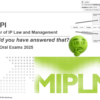Framing Your Expertise So Others Understand Its Value
Many IP experts don’t struggle with the substance of their work.
They struggle with helping others see why it matters.
You know the effort it takes to protect an innovation pipeline, manage complex filings, or advise on high-stakes licensing deals. But to the people around you (clients, colleagues, even internal stakeholders) that value isn’t always obvious.
Especially when your work is highly technical, it can feel like others only half-understand what you do. Or why it matters. That gap can cost you opportunities, trust, influence.
Why It Matters
In most professional settings, people make decisions based on what they think you bring to the table. Not necessarily on your full skillset. And definitely not on your job title.
That’s why perceptions matter, not in a superficial way, but in a practical one.
If decision-makers don’t fully understand how your work connects to their goals, they may not loop you in early enough. They may not prioritise your input. They may not even realise when they need you. Framing helps close that gap.
What Framing Is
Framing means shaping how people understand what you do, by giving them the right context. It’s not about simplifying your work. It’s about making your value easier to see.
That way, your role becomes clearer. More relevant. And harder to overlook.
Practical Framing Tools
There’s no single formula. But here are five ways to frame your expertise so others understand it faster, and connect it to what they care about:
- Show the effect of your work — not just the task
→ Instead of: “I manage patent filings”
→ Try: “I help avoid costly IP gaps before product launch” - Use before/after scenarios
→ “Before I stepped in, their IP contracts weren’t aligned across markets. Now, they have a single, enforceable structure.” - Offer relatable metaphors
→ “Think of it like an IP roadmap — so the company can scale without legal blind spots.” - Give the problem first, then your role in solving it
→ “Many clients come to me when their tech is ready to scale but their IP isn’t. I help them bridge that gap.” - Speak to what others gain — not just what you do
→ “My work helps general counsel sleep better at night, because they know their IP risks are covered.”
These shifts are subtle, but powerful, because they anchor your expertise in outcomes and not just activities.
A Real-World Shift
One IP strategist used to describe his job like this:
“I handle FTOs, competitor landscaping, and patent strategy.”
That is accurate, but not sticky.
Now, he says:
“I help product teams avoid surprises, so they can move faster without running into IP trouble.”
The work hasn’t changed, but the perception has. And so have the invitations to collaborate earlier in the process.
Final Thought
Framing isn’t self-promotion. It’s translation.
Because if others don’t fully understand what you do (or why it matters) they can’t act on it; they can’t advocate for you; and they won’t know when to bring you in.
Your expertise is valuable. But it becomes powerful when others can see how it connects to their goals.
Until then, a question to reflect on:
If you could shape how your ideal client introduces you to someone else, what would you want them to say — and why?
About the columnist
 Giulia Donato
Giulia Donato
Branding & Communication Advisor | Executive Coach | Lecturer
people & brand strategies
www.donatostrategies.com



